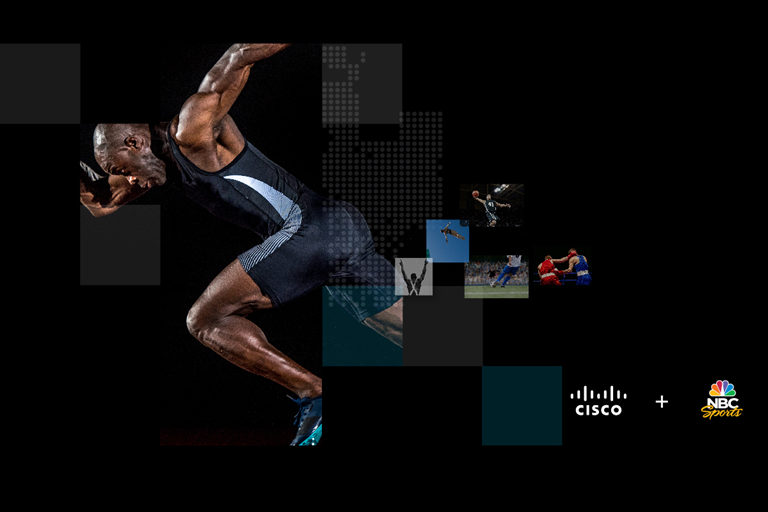An Olympic Feat: Powering NBCUniversal's Broadcast of the Tokyo Games

The a-ha moment from Rob Neumann happened in quarantine. The Cisco CTO for Olympic and Sponsored Programs was staying at the Tokyo Hilton, in mandatory quarantine upon arriving in Japan for the 2020 Olympics. As he looked out his window, with a view of Tokyo Bay, he could see NBC’s TODAY show set. Then, he looked at the TV. Unlike most, he knew exactly the technology that had to be in place for that to happen. The signal went from the set to the International Broadcast Center, then traveled some 6,700 miles to NBC Olympics’ studios in Stamford, Conn., then back to the TV in his Tokyo hotel. All in a matter of seconds. “For me to watch what’s happening right below me, with a signal going around the world and back and going on a Cisco network was awesome,” says Neumann.
That feat of instantaneous global signal flow was made possible with Cisco’s technology. For the Tokyo Games, Cisco helped power the first all-IP production in the host city for NBC Olympics’ coverage of the Games. The Olympics have long been a home for technological innovation. When the Games were first held in Tokyo in 1964, it made history for being the first live televised broadcast. Fifty-seven years later, with the help of 6,700 pieces of Cisco equipment, NBC Olympics was able to deliver more than 7,000 hours of coverage across multiple platforms.
“The technology itself, the network, the connectivity, the bandwidth—it all worked flawlessly,” says Dan Robertson, VP NBC Olympics IT. “It was not something we had to troubleshoot. We were able to focus on the product. In Games past, there’s usually been some kind of anomaly or something that’s impacted us, that’s hampered our ability to focus on other aspects of the production. Our Cisco technologies, services and support worked flawlessly in these Games.”
That reliability, always important, was even more vital due to the unique nature of these Games. Because of COVID-19, production was split between crews in Tokyo and employees back at NBCUniversal’s studios in Stamford, New York, Englewood Cliffs, Miami, and Sky Sports in the UK, there was increased importance on sending the content back for some venue production and to then be distributed.
“We had a dependence on getting content back to Stamford,” says Robertson. “We had to get content from the various venues to our dedicated connection back to the IBC and then back to the US. And it was all solid. Comms worked, video worked, broadcast worked, wireless worked. We’re working with a 13-hour time difference. When you need to connect, you need to connect. The Games were happening regardless of our readiness.”
Cisco Nexus 9000 Series switches delivered more agility, with improved bandwidth at higher resolutions. That, combined with Cisco DNA Assurance, which uses Artificial Intelligence, machine learning and wireless sensors for easy management of all devices and services, ensured no downtime and 100% availability. That allowed NBC Olympics to have a heavy dependency on bandwidth, with low latency. That technology allowed for flawless execution of the broadcast, as feeds were bouncing all around the globe, with viewers none the wiser.
Not only that, but the visuals surrounding the Games were better than ever. “We moved to HDR for these Games,” said Robertson, referring to High Dynamic Range, which is more impactful to the human eye than 4K. “The ability to capture all that content and move it around,” he says, was essential to a high-quality production.
Beyond the strength of the network, NBC Olympics relied on other Cisco technology to produce these Games. With 50 Webex Video Conferencing units in Tokyo, and another 25 in Stamford, teams across the globe were able to communicate in real-time. And, to help keep those in Tokyo connected with those back home, Cisco installed standing units in common areas, for a live video connection around the world and back. Webex calling also allowed NBC Olympics staff to add a local Japanese phone number to their US mobiles, reducing the need to carry a separate mobile phone for sending and receiving local calls while in Tokyo.
“Our dependence on Cisco is significant in the host city,” says Robertson. “The same back home. It’s the bread and butter. We couldn’t have done it without what Cisco brings to the table.”





